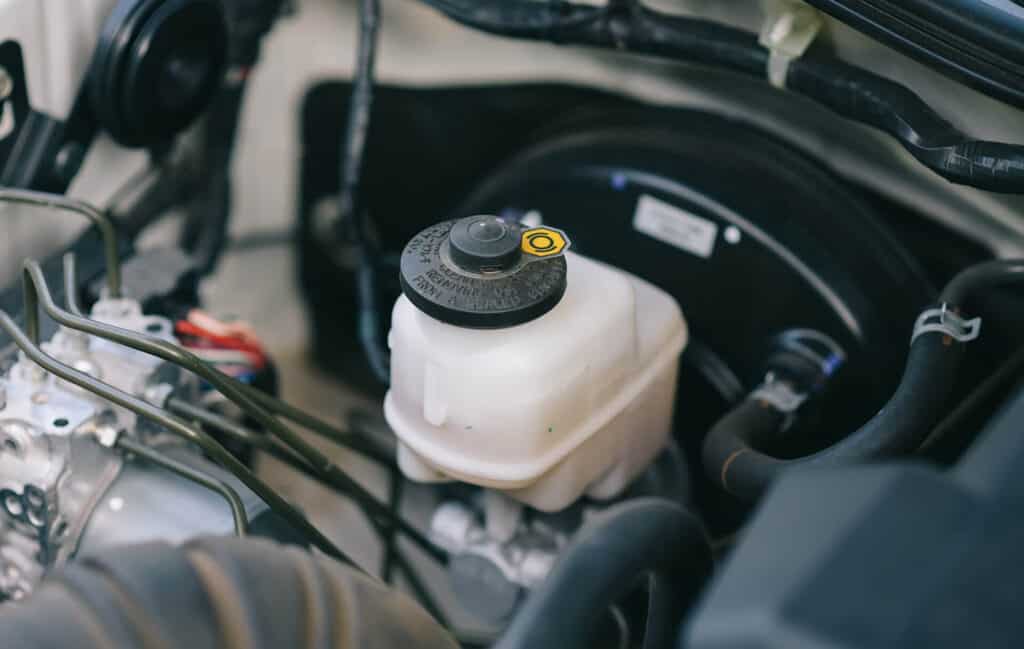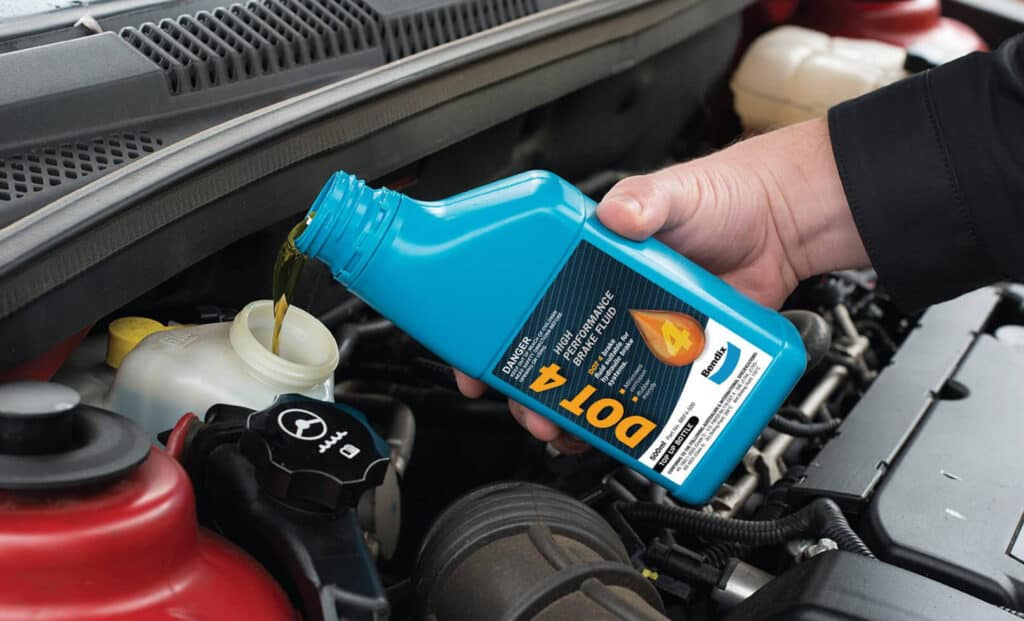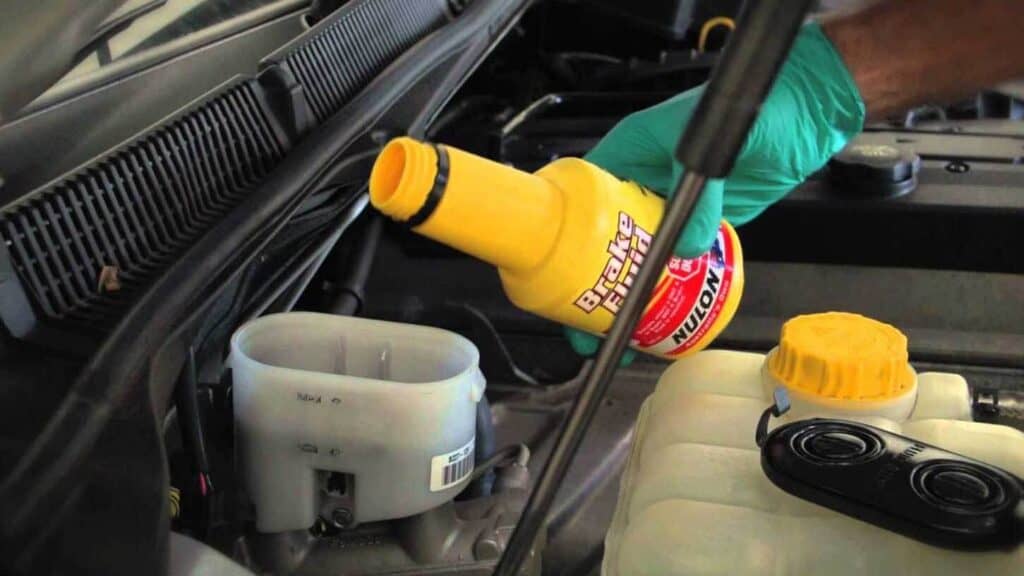What is a Brake Fluid Change?
A brake fluid change is a maintenance procedure that involves draining the old brake fluid from your vehicle’s braking system and replacing it with fresh fluid. Brake fluid is crucial for the hydraulic braking system as it transmits the force you apply to the brake pedal to the brake calipers, allowing the vehicle to stop.
How Much Will it Cost to Perform a Brake Fluid Change in Canada?
The cost of a brake fluid change can vary depending on the make and model of your vehicle, as well as the type of brake fluid used. However, on average, you can expect to pay between $75 to $150 for this service in Canada. This price usually includes the cost of the brake fluid, labour charges, and taxes. It should typically take about 1 to 2 hours to perform a complete brake fluid change.

Signs That Indicate the Need for a Brake Fluid Change
• Discoloration of Brake Fluid: Fresh brake fluid is typically clear to amber in color. If your brake fluid looks dark brown or black, it’s likely contaminated with dirt, rust, or other debris and needs to be changed.
• Spongy or Soft Brake Pedal: If your brake pedal feels spongy or softer than usual, it could indicate that your brake fluid is contaminated with air or moisture. This usually requires a brake fluid change to restore the system to proper working order.
• Longer Stopping Distances: If you’ve noticed that your vehicle is taking longer than usual to come to a stop, this could be a sign that your brake fluid is old and not providing the proper hydraulic force to your brake pads.
• Warning Light on Dashboard: Many modern vehicles come with a warning light on the dashboard that indicates when your brake fluid is low or dirty. If this light comes on, it’s time to have your brake fluid checked and possibly changed.
• Strange Noises When Braking: If you hear grinding or squealing noises when braking, it could be a sign that your brake fluid is contaminated and not properly lubricating the brake system. This could lead to premature wear and tear on your brake pads and rotors.
• ABS Light Activates: If your Anti-lock Braking System (ABS) light turns on, it could be due to dirty or low brake fluid affecting the system’s operation.
Importance of Regular Brake Fluid Changes
Over time, brake fluid can become contaminated with dirt, moisture, and other debris, which can affect its performance. Regular brake fluid changes are vital to ensure the effectiveness of the braking system, maintain vehicle safety, and prevent costly brake repairs down the line.
How Does a Brake Fluid Change Work?
During a brake fluid change, a mechanic will first drain the old, contaminated fluid from the braking system. Next, they will clean the system to remove any lingering contaminants before filling it up with fresh brake fluid. Finally, the mechanic will bleed the brakes to remove any trapped air in the system, which can negatively impact braking performance.

Can a Brake Fluid Change Improve Brake Performance?
• Enhanced Responsiveness: Fresh brake fluid can enhance the responsiveness of the brake system. Contaminated or old fluid can cause brake components to stick or react sluggishly, impacting braking performance. Fresh fluid alleviates this issue, leading to quicker, smoother brake response.
• Improved Safety: Clean brake fluid optimizes the entire braking system’s performance, which translates into shorter stopping distances. This can significantly improve safety, particularly in emergency situations where every millisecond counts.
• Prolonged Lifespan of Brake Components: Contaminated brake fluid can cause wear and damage to the various components of the braking system. By replacing old, dirty fluid with new, you can help to prolong the lifespan of these components, reducing repair and replacement costs over time.
• Enhanced ABS Performance: Anti-lock braking systems (ABS) rely on clean, high-quality brake fluid to function optimally. A brake fluid change can thus improve ABS performance, leading to better control and stability when braking.
• Consistent Brake Feel: Over time, contaminated fluid can cause the brake pedal feel to change (becoming either too hard or too soft). A fluid change restores the brake fluid to its optimal condition, ensuring a consistent and reliable brake feel.
Is it Safe to Drive with Old or Contaminated Brake Fluid?
Driving with old or contaminated brake fluid can pose serious risks to your safety on the road. Brake fluid is essential for the proper functioning of your car’s braking system as it helps transfer the force from the brake pedal to the brake pads. Over time, brake fluid can degrade or become contaminated with water, air, or debris, reducing its effectiveness. This contamination can lead to diminished brake performance, potentially making it harder to stop your vehicle when needed. In severe cases, contaminated brake fluid could even result in complete brake failure, which could be disastrous on the road.
While a vehicle with slightly aged or minimally contaminated brake fluid may not exhibit noticeable issues in normal driving conditions, the risk increases significantly under demanding situations such as sudden stops, downhill driving, or in instances where ABS (Anti-lock Braking System) comes into play. These scenarios require optimal brake performance, and having old or contaminated fluid can result in increased stopping distances, unresponsive brakes, or uneven braking, each of which can increase the risk of a collision. Therefore, it is not safe to drive with old or contaminated brake fluid, and any signs of issues with your brakes should prompt immediate attention.
Tips to Maintain Healthy Brake Fluid
• Regular Checks: Regularly inspect the brake fluid level in the master cylinder reservoir to ensure it’s within the recommended range.
• Monitor Fluid Color: Keep an eye on the color of your brake fluid. If it turns dark or black, it’s time for a change as this indicates contamination.
• Service Intervals: Follow the manufacturer’s recommended service intervals for brake fluid changes. This is typically every two years or every 20,000 to 30,000 miles, but can vary based on your vehicle and driving conditions.
• Professional Inspections: Have a professional inspect your brake fluid during regular service appointments or oil changes. They have the knowledge and tools to accurately assess the condition of your brake fluid.
• Warning Signs: Pay attention to changes in your braking system’s performance. If you notice the brake pedal feels spongy, the brakes are slow to respond, or you see the brake warning light on your dashboard, have your brake fluid checked immediately.
• Seal the Brake Fluid Container: If you have a bottle of brake fluid for top-ups, ensure it is sealed tightly after use. Brake fluid is hygroscopic, meaning it absorbs moisture from the air, which can lead to contamination.
Can a Mobile Mechanic Perform a Brake Fluid Change?
Yes, a mobile mechanic can perform a brake fluid change. Mobile mechanics are fully equipped to carry out a variety of services, including brake fluid changes, at a location convenient to you.

Conclusion: Importance of Regular Brake Fluid Changes for Safe Braking
Regular brake fluid changes are essential for maintaining the safety and efficiency of your vehicle’s braking system. By keeping up with this maintenance task, you can ensure a responsive braking system, prevent costly brake repairs, and most importantly, ensure your vehicle is safe to drive.
Next Steps
Book Your Oil and Filter Change Service
The service most frequently booked by those who read this article is Oil and Filter Change. Uchanics’ expert technicians make the process even more convenient by bringing the service right to your doorstep. We perform this job at your home or office, covering over 40 cities in Ontario, including Oshawa, Ajax, Toronto, Scarborough, Mississauga, Brampton, and more. Our commitment to excellence has earned us more than 700 glowing 5-star reviews. Choose Uchanics for your Oil and Filter Change and experience unparalleled convenience and top-quality service.
